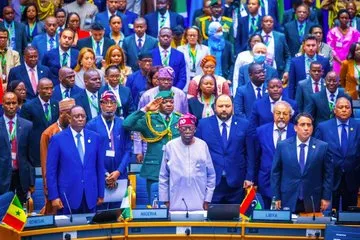The leaders conducted a comprehensive review of the political and security situations in the sub-region, with particular emphasis on the transitions occurring in Mali, Burkina Faso, and Guinea.
President Bola Tinubu of Nigeria convened a closed-door meeting on Tuesday, July 18, with three regional leaders and the President of ECOWAS. The gathering, held at the Presidential Villa in Abuja, focused on formulating effective strategies to combat insecurity in the sub-region.
The meeting has reportedly witnessed the participation of President Patrice Talon of Benin, President Umaru Embalo of Guinea-Bissau, and President Mohamed Bazoum of Niger Republic.
West Africa has been facing various forms of insecurity, including terrorism, armed conflict, organized crime, and political instability. These challenges have had devastating consequences for the affected countries and their populations.
The presence of extremist groups, such as Boko Haram in Nigeria, Al-Qaeda in the Islamic Maghreb (AQIM) in Mali and the Sahel region, and Islamic State West Africa Province (ISWAP) in the Lake Chad Basin has caused death and displacements of hundreds of thousands in the sub-region.
During the meeting, ECOWAS Commission President, Dr Omar Touray, read out the resolutions reached by the leaders. According to him, the leaders conducted a comprehensive review of the political and security situations in the sub-region, with particular emphasis on the transitions occurring in Mali, Burkina Faso, and Guinea.
With regards to the political landscape, the leaders made the decision to re-engage these three countries at the highest levels. President of the Republic of Benin and member of the Troika, His Excellency Patrice Talon, will undertake a mission to these nations on behalf of the Heads of State.
Furthermore, the leaders reasserted their commitment to facilitating a prompt transition to democracy in these countries, adhering strictly to ECOWAS protocols and their individual transition charters.
In terms of security, the leaders agreed to implement a robust regional response to counter any threats in the area. This response will involve operationalizing the ECOWAS plan of action, utilizing regional troops and financing. External financial assistance will also be welcomed.
Additionally, individual member states will receive support as part of the security response, employing specific peace and security models as necessary. The leaders affirmed their dedication to providing adequate resources for the region’s peace and security initiatives.
‘’The regional response shall include the operationalisation of the ECOWAS plan of action, with the region’s own troops and region’s own financing. Financing from other partners will be welcome,” Touray said.
He explained that ‘’security response shall also include support to individual member states of the region. The response shall also include the use of specific arrangements, such as specific models of peace and security.
‘’Adequate resources will be provided to the region’s response to peace and security. These are the resolutions and the commitments that the leaders have taken during the close door session.’’
President Tinubu, who serves as the ECOWAS Chairman, emphasized the need to establish a comprehensive system that will effectively achieve the objectives of peace and security in the sub-region.
He expressed confidence in the region’s ability to raise the necessary funds and highlighted the commitment of the leaders to allocate resources toward combating terrorism and insecurity.
‘’Concerning our desire for re-engineering of our own finances, we believe we are capable of raising necessary funds to combat terrorism and insecurity in the region,’’ Tinubu said.














